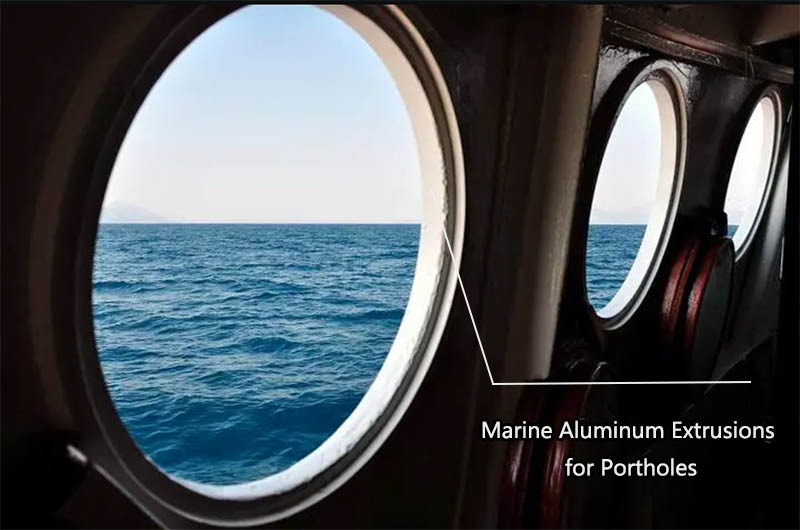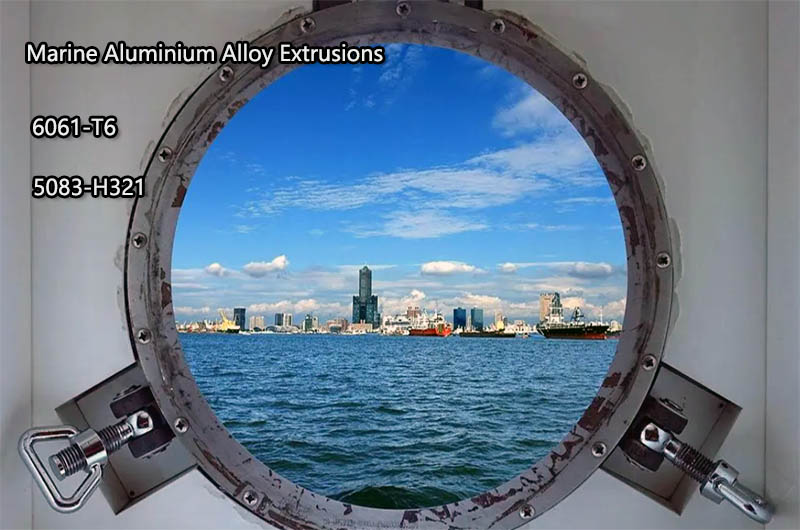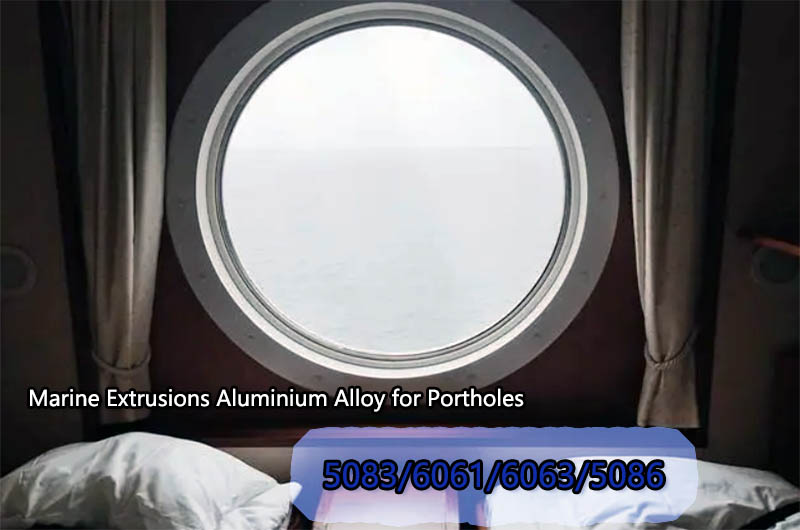Marine Aluminum Extrusions for Portholes
Alloy: 5083/6061 Corrosion resistance, high strength
Portholes, also known as scuttles, are small, circular windows typically found on the sides of boats and ships.
Portholes are usually made of a sturdy material such as metal or glass and are usually fitted with hinged or fixed covers, called portholes or deadlights, which can be opened or closed as desired.
The main functions of portholes include:
- Light and ventilation: let light and fresh air into the interior spaces of the vessel
- Visual Observation: Portholes provide means for persons on board to observe their surroundings.
- Safety and emergency access: In emergency situations, portholes can serve as an alternative escape route or access point for rescue operations.

Portholes come in a variety of sizes and designs, and their location on the hull depends on factors such as the ship's layout, purpose, and architectural style. Commonly found on sailboats, motorboats, and larger watercraft, they provide both functional and aesthetic elements to a vessel's design.
Marine aluminum profiles can be used for the frame of the ship or the frame of the porthole. These extrusions are usually made of aluminum alloys for their strength, corrosion resistance, and durability in marine environments. The specific alloy and temper used may vary according to the requirements and preferences of the boat builder or owner.
Marine Aluminum Extrusions for Portholes Specifications
Alloys commonly used in Marine Aluminum include 6061, 6063, or 5083 aluminum alloys. These alloys have good strength and corrosion resistance, making them suitable for marine applications.
| Alloy | Common Dimensions (Outer Diameter x Wall Thickness) |
|---|---|
| 6061-T6 | 100 mm x 4 mm |
| 150 mm x 6 mm | |
| 200 mm x 8 mm | |
| 5083-H321 | 120 mm x 5 mm |
| 180 mm x 7 mm | |
| 250 mm x 10 mm |
Mechanical Properties (Typical values for 6061-T6 and 5083-H321)
| Mechanical Properties | 6061-T6 | 5083-H321 |
|---|---|---|
| Ultimate Tensile Strength (MPa) | 290-310 | 270-305 |
| Yield Strength (MPa) | 240-260 | 200-240 |
| Elongation (%) | 12-17 | 12-16 |

Common Size:
- External Diameter (OD): Typically ranges from 100 - 400 mm, depending on the size of the porthole.
- Wall Thickness: Varies according to porthole size and design requirements, usually between 4 - 10mm.
Temper: Extrusions are typically produced in a T5 or T6 temper, which increases strength and hardness.
Shapes and Designs: Profiles are manufactured in various shapes and designs to meet the specific requirements of porthole frames. This can include round or rectangular shapes, with different profiles and dimensions to suit the desired size and style of the porthole.
Surface Finish: Extrusions may have a natural abrasive finish, which is the standard finish after extrusion processing.
Marine Extrusions Aluminum Alloy for Portholes can be used for additional surface treatments such as:
- Anodized
- Powder coated
To enhance corrosion resistance and provide the desired aesthetic appearance.
Aluminum profiles for marine applications offer several advantages for portholes, including lightweight construction, corrosion resistance, and ease of fabrication. They can be customized to meet specific design requirements and provide a durable and aesthetically pleasing solution for porthole frames on ships operating in marine environments.
Marine Extrusions Aluminum Alloy for Portholes
The choice of porthole aluminum alloy can depend on various factors such as the size of the porthole, the marine environment, and the specific requirements of the ship. The following are some commonly used porthole aluminum alloys:
- 5083 Aluminum Alloy: This alloy is widely used in marine applications due to its excellent corrosion resistance, high strength, and weldability. It is typically used for larger portholes or those exposed to harsh sea conditions.
- 6061 Aluminum Alloy: This alloy is known for its good strength, formability, and corrosion resistance. It is commonly used on small to medium portholes or on boats and vessels operating in less extreme marine environments.
- 6063 Aluminum Alloy: This alloy was widely chosen for its excellent extrudability, making it suitable for porthole frames of complex shapes and contours. It has good corrosion resistance and is usually used for small and medium portholes.
- 5086 Aluminum Alloy: Similar to 5083, this alloy is known for its high corrosion resistance and strength. It is commonly used on portholes exposed to salt water or corrosive marine environments.

These alloys offer a balance of strength, corrosion resistance, and machinability making them suitable for porthole applications. The particular alloy selected may also depend on the desired surface finish, manufacturing requirements, and compatibility with other materials used in the porthole construction.
It is worth noting that the choice of aluminum alloy should consider the specific needs of the ship, and it is recommended to consult a marine engineer or porthole manufacturer to determine the most suitable alloy for your porthole application.
Recommended content you might be interested in
-
5083 Marine Aluminum Plate Sheet
We have ABS, BV, DNV, CCS, and other marine classification certifications, and a strict quality control system to ensure that 5083 marine aluminum sheets meet the required standards and specifications.
-
5086 Marine Aluminum Plate Sheet
We have ABS, BV, DNV, CCS, and other ship classification certifications. The 5086 ship plate is stable, corrosion-resistant, and can withstand harsh marine environments.
-
5052 Marine Aluminum Plate Sheet
We have ABS, BV, DNV, CCS, and other marine classification certifications, and a strict quality control system to ensure that 5052 marine aluminum sheets meet the required standards and specifications.
-
6082 marine aluminum plate is an aluminum alloy commonly used in marine applications. Like other marine-grade aluminum alloys, 6082 has a variety of properties that make it well suited for use in ships and other marine structures.
-
5754 marine aluminum plate is a deformed aluminum-magnesium alloy known for its excellent performance in the marine industry.
-
One of the key benefits of 5456 marine aluminum plate is its excellent corrosion resistance in saltwater and seawater environments. This resistance to salt water corrosion is critical to ensuring the longevity and structural integrity of marine components.
-
5383 aluminum alloy is commonly used in the construction of ships and other marine structures because they can withstand the harsh conditions of salt water and provide good structural integrity.
-
5454 aluminum plate exhibits excellent corrosion resistance, especially in marine environments. It effectively resists the corrosive effects of salt water and seawater, making it ideal for prolonged exposure to these conditions.
-
5059 marine grade aluminum plate meets specific industry or international standards, such as those set by American Bureau of Shipping (ABS), Det Norske Veritas (DNV), CCS or other organizations.
You might like the following content
-
5083 Aluminum Plate Sheet
5083 aluminum plate is a non-heat treatable alloy with high strength and corrosion resistance. We offer a wide range of sizes, thicknesses, and specifications at affordable prices to meet customer-specific needs.
-
5083 H32 Aluminum Plate Sheet
5083 H32 aluminum plate has excellent corrosion resistance, good weldability, and high strength. The surface of the 5083 h32 Aluminum Plate has no oil spots, no waves, no scratches, no roll marks, and meets the production standards.
-
5086 Aluminum Plate Sheet
5086 aluminum is not strengthened by heat treatment, but rather becomes stronger by strain hardening or cold machining of the material. 5086 aluminum sheet is commonly used in marine, cryogenic, pipeline, military, chemical and gas/oil/petroleum applications.
-
6063 Aluminum Plate Sheet
6063 is often called building aluminum, and 6063 aluminum plate has excellent hardness and processability and excellent anode oxidation performance.

